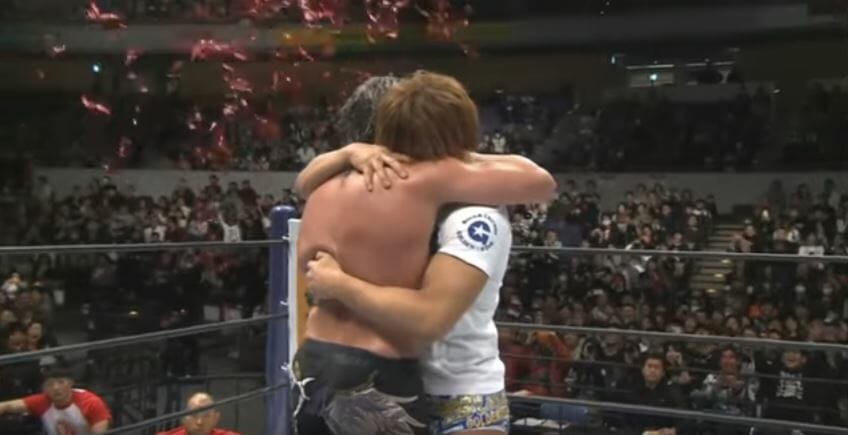Kenny Omega and Kota Ibushi’s Relationship Is a Crucial Step for Queer Representation in Wrestling

Those who only pay attention to the American pro wrestling landscape are currently missing out on one of the single greatest stories ever told in the vicinity of a ring over in New Japan Pro Wrestling: the ten-year odyssey of Kenny Omega and Kota Ibushi, collectively known as the Golden Lovers.
Here’s a quick recap. The two former tag team partners and close friends went their separate ways in 2014 after the momentous original four-year run of the Golden Lovers as individual goals overtook those of the collective. While Ibushi won the hearts of the fans and respect of his fellow wrestlers, Omega felt abandoned and channeled his anger into one of the most memorable two-plus year runs in recent history. As Omega joined and eventually took over the key villain NJPW stable, Bullet Club, he constantly deflected any mention of Ibushi, choosing to not acknowledge his unresolved emotions even as Ibushi began trying to re-enter his life following a tough loss in the G1 final last August. Ibushi’s attempts to win back Omega drew the ire of fellow Bullet Club member Cody Rhodes, and when he challenged him to a match at January’s Wrestle Kingdom 12, a wedge was driven between the two alpha males in the group. All of these small moments culminated in Cody attacking Omega in February. Before Cody could finish the job, though, Ibushi sprinted to the ring to save his former partner, and, after refusing to shake Ibushi hand, with tears building as everything he internalized over the past four years finally came out, Omega and Ibushi embraced in the middle of the ring as a shower of confetti rained down on the reunited Golden Lovers.
Now, if you think that sounds pretty gay, A. shame on you, and B. you’re totally right. It is pretty gay, and that’s one of the main reasons why this story stands out above every other one in pro wrestling right now.
Pro wrestling and homosexuality have a misinformed and, let’s face it, frustrating past. The machismo-drenched artform has featured gay wrestlers, such as the legendary Pat Patterson, going as far back as the ‘50s, but rarely have they lived their lifestyle completely open while being an active competitor. The business has featured effeminate male characters that are presented under the moniker “androgynous” in order to not classify a grappler as overtly gay dating back to the ‘40s. Comically drenched in make-up and usually accompanied by an attractive female valet, it’s a tradition focused on drawing the fans’ ire or by groping or kissing a wrestler during a match. It’s almost always a transparent tactic, though, and never a true statement of homosexuality.
Yes, pro wrestling has always been about over-the-top personalities, but a sense of alienation persists when the only representation that those in the queer community, myself included, have in mainstream wrestling companies is Goldust and his cruddy knockoffs.
-

-

-

-

-

-

-

-

-

-

-

-

-

-

-

-

-

-

-

-

-

-

-

-

-

-

-

-

-

-

-

-

-

-

-

-

-

-

-

-








































